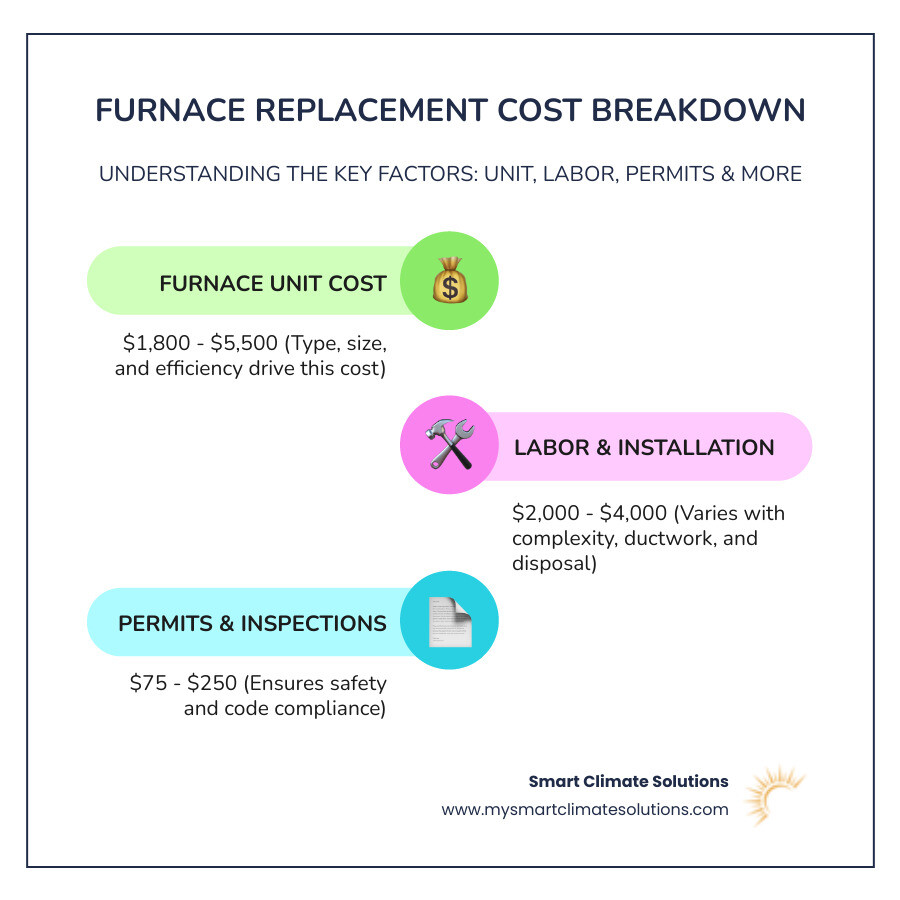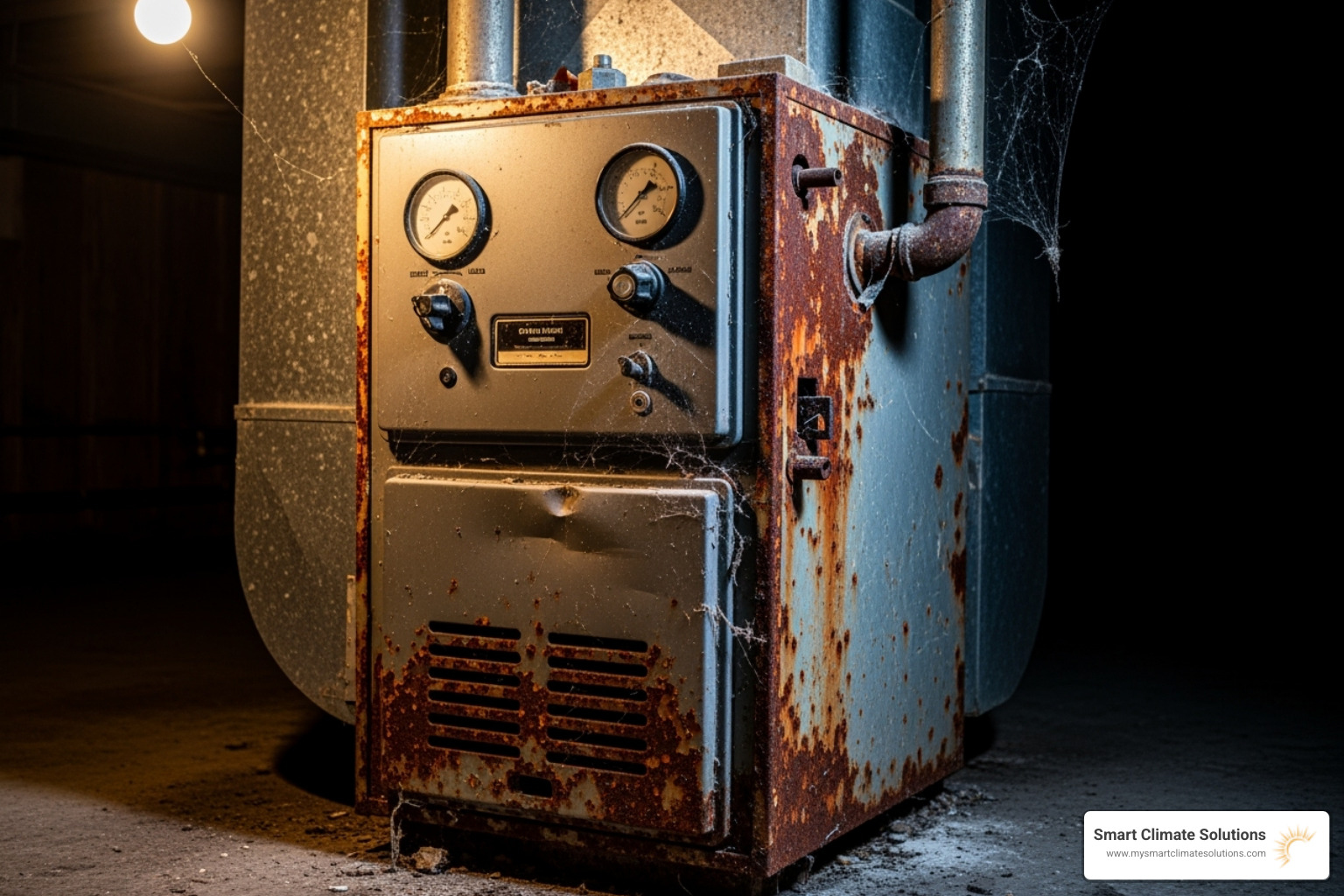Understanding Your Furnace Investment
When your heating system fails, the furnace replacement cost is a primary concern. Understanding the upfront investment is key to making a smart decision for your home's comfort and energy efficiency.
Quick Answer: Furnace Replacement Cost Overview
- Average Total Cost: $3,800 - $10,000 (including installation)
- Gas Furnaces: $3,800 - $10,000 installed
- Electric Furnaces: $2,000 - $7,000 installed
- Oil Furnaces: $6,750 - $10,000 installed
- High-Efficiency Models: $5,000 - $12,000 installed
Key Cost Factors:
- Furnace type and fuel source
- Size and heating capacity (BTU)
- Energy efficiency rating (AFUE)
- Installation complexity and labor
- Additional components and permits
During Pittsburgh's cold winters, your furnace is one of your home's hardest-working appliances. When it's time for a replacement, you need clear, reliable information. The wide price range reflects variables like furnace type, home size, and efficiency rating. A basic gas furnace for a small home will cost less than a high-efficiency model for a large house with complex ductwork.
With over 15 years in the HVAC industry, I'm Bill Scott, and I've helped thousands of homeowners in Southwestern Pennsylvania steer their furnace replacement. My experience at My Smart Climate Solutions shows that informed homeowners make better choices and get more value from their heating investments.

Key Factors Influencing Your Furnace Replacement Cost
This section breaks down the primary elements that determine the final price of your new furnace, ensuring you know what to expect.
Furnace Type and Fuel Source
The type of furnace you choose is a significant driver of the total furnace replacement cost. Your choice is often dictated by local fuel availability and your home's existing infrastructure. Each fuel type-natural gas, electric, propane, and oil-has unique upfront costs and long-term operational expenses.
Natural gas furnaces are the most common choice in areas like Pittsburgh, PA, due to wide availability and lower operating costs. Electric furnaces are cheaper to install but can be more expensive to run in cold climates. Propane and oil furnaces are viable options for homes without natural gas access but typically have higher installation and fuel costs.
Here's a quick comparison of common furnace types:
| Furnace Type | Unit Cost (Installed) | Typical Operating Cost (Annual) | Pros | Cons |
|---|---|---|---|---|
| Natural Gas | $3,800 - $10,000 | $400 - $700 | Widely available, lower operating costs, efficient heat | Requires gas line, potential carbon monoxide risk |
| Electric | $2,000 - $7,000 | $1,600 - $2,200 | Lower upfront cost, no carbon monoxide, long lifespan | Higher operating costs in cold climates, slower heating |
| Propane | $3,000 - $14,200 | 2-3x Natural Gas | Good for rural areas without gas lines, clean burning | Requires tank, higher fuel costs, less efficient than gas |
| Oil | $6,000 - $10,000 | Higher than Natural Gas | Reliable heat, good for areas without gas access | Requires storage tank, higher fuel costs, less clean burning |
While some options are cheaper upfront, we encourage looking at the long-term picture. A lower installation cost might mean higher energy bills, especially in our chilly Pennsylvania and Ohio winters.
Furnace Size and Capacity (BTU)
Furnace size refers to its heating capacity, measured in British Thermal Units (BTU). One BTU is a measure of heat and energy needed to raise 1 pound of water by 1 degree Fahrenheit. Choosing the right BTU output is crucial for efficiency and comfort.
An average home needs 30 to 60 BTUs per square foot, but this varies based on insulation, windows, and climate. To determine the precise size, we perform a Manual J load calculation, which analyzes your home's specific thermal characteristics. Proper sizing is critical:
- Oversized furnaces "short cycle," turning on and off too frequently. This wastes energy, causes uneven heating, and puts excess wear on components, leading to premature breakdowns.
- Undersized furnaces run constantly without adequately heating your home, especially during cold snaps. This drives up energy consumption and strains the unit.
Our certified technicians in Pittsburgh, South Hills, and surrounding areas are experts at pinpointing the perfect furnace size for your home, ensuring optimal comfort and efficiency.
Energy Efficiency (AFUE Rating)
The Annual Fuel Utilization Efficiency (AFUE) rating measures how efficiently a furnace converts fuel into heat. An 80% AFUE furnace converts 80% of its fuel to heat, with 20% lost as exhaust. The United States Department of Energy requires new furnaces to have at least an 80% AFUE rating.
Higher AFUE ratings mean greater energy savings, though the upfront furnace replacement cost is higher:
- Standard Efficiency (80-89% AFUE): Costing $3,000-$5,000, these are the most affordable but least efficient.
- Mid-Efficiency (90-95% AFUE): Ranging from $4,000-$8,000, these offer a good balance of cost and savings.
- High-Efficiency (96%+ AFUE): These units cost $6,000-$12,000 but offer substantial long-term savings, often paying for themselves over their lifespan. Upgrading from an older 70% AFUE system to a 96% model can reduce fuel consumption by 27%.
We often find that investing in a higher AFUE furnace is a smart long-term move in our colder service areas. You can learn about the most efficient residential heating system options on our blog.
Labor and Installation Complexity
Labor is a significant part of the total furnace replacement cost, typically ranging from $1,000 to $3,000. This cost can vary based on the complexity of the job.
Key installation factors include:
- Ductwork Modifications: Adjustments to fit a new unit or fix existing issues can add $500 to $3,000.
- Permit Fees: Required for safety and code compliance, these fees typically range from $50 to $300.
- Old Unit Disposal: Proper disposal of your old furnace usually costs between $50 and $200.
- Utility Line Modifications: Electrical or gas line updates can add $200 to $700.
- Accessibility: Difficult-to-reach locations like attics or crawl spaces can increase labor hours and cost.
The quality of installation is paramount. A cheap installation can lead to efficiency losses, voided warranties, and safety hazards. That's why choosing experienced, licensed professionals is essential. Find more on residential HVAC installation cost on our website.
Is It Time to Replace? Repair vs. Replacement
Deciding whether to repair your old unit or invest in a new one is a major financial decision. Here is how to determine the most cost-effective path.
Telltale Signs You Need a New Furnace
Your furnace often gives hints that it's nearing the end of its life. Ignoring these can lead to sudden breakdowns and discomfort. Look for these signs:
- Furnace Age: Most furnaces last 15 to 20 years. If yours is in this range, it's time to start planning for a replacement.
- Rising Energy Bills: If your heating costs are climbing without a change in usage, your furnace is likely losing efficiency.
- Frequent Repairs: Are you calling for service every winter? The cumulative cost of repairs can quickly add up, making a new unit a better investment.
- Strange Noises: Banging, squealing, or rattling sounds can indicate failing components like a blower motor or a cracked heat exchanger.
- Inconsistent Heating: If some rooms are too hot while others are cold, your furnace may no longer be able to distribute heat effectively.
- Poor Air Quality: An old furnace can contribute to excessive dust, dry air, or strange odors, signaling it's time for an inspection.

We advise homeowners in Weirton, WV, and St. Clairsville, OH, to watch for these warnings to avoid a mid-winter breakdown.
Calculating the furnace replacement cost vs. repair cost
To decide between repair and replacement, we often use a "50% rule": if a repair costs 50% or more than a new furnace, replacement is usually the better financial choice.
Minor repairs like a flame sensor replacement ($75 - $250) are worth it. However, major repairs on an aging system can be costly:
- Blower Motor Replacement: $400 - $1,500
- Draft Inducer Motor Replacement: $200 - $1,500
- Heat Exchanger Replacement: $500 - $1,500
- Gas Valve Replacement: $200 - $1,000
If your furnace is over 15 years old and needs a repair costing over $1,000, replacing it often makes more sense. The initial furnace replacement cost is higher, but you get a new warranty, improved efficiency, and peace of mind for 15-20 years. You can learn more about the cost to replace furnace fan on our blog.
Why Professional Installation is Non-Negotiable
We cannot stress this enough: installing a furnace is not a DIY project. It requires specialized knowledge and tools to avoid significant risks.
- Safety Risks: Furnaces involve combustible fuels and produce carbon monoxide. Improper installation can lead to dangerous gas leaks, CO poisoning, and fires. Our certified technicians are trained to handle these systems safely.
- Warranty Voiding: Manufacturers require professional installation to validate their warranties. A DIY job will likely void your warranty, leaving you responsible for future repair costs.
- Code Compliance: Local building codes in areas like Washington, PA, regulate furnace installations. Professionals ensure your system is installed correctly and passes inspection, avoiding fines and future issues.
- Optimal Performance: An amateur installation leads to higher energy bills, poor heating, and a shorter lifespan for your unit.
At My Smart Climate Solutions, our team has over 15 years of experience. We provide information on HVAC service and repair that emphasizes professional expertise, ensuring your new furnace is installed safely and efficiently.
Budgeting for Your New Furnace: Costs, Savings, and Financing
Understanding the full financial picture, from initial quotes to long-term savings, helps you budget effectively for this important home upgrade.
A Breakdown of the Total Furnace Replacement Cost
When we provide a quote for your furnace replacement cost, we believe in complete transparency. The final number includes more than just the unit itself. Here's what to expect:
- Unit Cost: The price of the furnace, typically $1,800 to $5,500, depending on type, size, and efficiency.
- Labor Cost: Professional installation by certified technicians, usually between $1,000 and $3,000. Our technicians' hourly rates are generally $75 to $100 per hour.
- Additional Materials: This can include new wiring, gas lines, or a new thermostat. A smart thermostat upgrade can add $150 to $400.
- Permits and Fees: Required for safety and code compliance, these fees typically add $50 to $300 to the total.
- Disposal Fees: We handle the removal and responsible disposal of your old furnace, which usually costs between $50 and $200.
The national average for replacing a gas furnace in a 1,600 to 2,000-square-foot home is around $7,000. A high-efficiency model could reach $12,000, but the higher upfront cost often leads to significant long-term savings.
Finding Savings: Rebates, Tax Credits, and Maintenance
While the upfront furnace replacement cost can be significant, there are several ways to save money. We help our customers take advantage of every opportunity.
- Federal Tax Credits: The Inflation Reduction Act of 2022 offers a tax credit of 30% of the project cost (up to $600) for qualifying high-efficiency furnaces (90% AFUE or greater) installed between 2023 and 2032. The credit for a qualifying heat pump can be up to $2,000. Check the EnergyStar furnace tax credit website for details.
- Utility Rebates: Many local utility companies in our service areas, including Pittsburgh, PA, and Steubenville, OH, offer rebates for installing high-efficiency furnaces. These can save you hundreds of dollars.
- Manufacturer Promotions: We stay on top of seasonal promotions and special rebates from furnace manufacturers and pass those savings on to you.
- Strategic Timing: If possible, scheduling your replacement during the off-season (spring or early summer) can sometimes lead to better deals and more flexible scheduling.
- Annual Maintenance: Regular tune-ups are the best way to maximize your new furnace's lifespan and efficiency. A well-maintained furnace can last 15-20 years, saving you money on future repairs and energy bills. We offer comprehensive heating maintenance plans to keep your system in top shape.
Frequently Asked Questions about Furnace Replacement
What is the typical lifespan of a furnace?
A well-maintained furnace should last 15 to 20 years. Some models, particularly electric ones, can last even longer. The key factors influencing lifespan are the quality of the unit, how much it's used, and, most importantly, consistent professional maintenance. An annual tune-up before the heating season is the best way to ensure your furnace runs efficiently, prevent major breakdowns, and extend its life. As noted by manufacturers like Carrier, proper maintenance is crucial for longevity. You can read more on their site: A furnace can last 15 to 20 years.
How does furnace size (BTU) affect cost and performance?
Getting the right furnace size (measured in BTUs) is critical for both cost and comfort. An oversized furnace will "short cycle" (turn on and off too frequently), which wastes energy, creates uneven temperatures, and causes premature wear. An undersized furnace will run constantly without being able to keep your home warm, driving up energy bills and straining the system. A professional Manual J load calculation ensures your furnace is perfectly sized for your home, providing efficient operation, consistent warmth, and a longer lifespan.
Can I install a furnace myself to save money?
We strongly advise against DIY furnace installation. While it may seem like a way to save money, the risks are significant. Furnaces involve gas lines, high-voltage electricity, and combustion, making improper installation extremely dangerous. It can lead to gas leaks, carbon monoxide poisoning, and fires. Furthermore, a DIY installation will void the manufacturer's warranty and likely violate local building codes, which can lead to fines and issues when selling your home. For safety, performance, and peace of mind, always hire a licensed, certified HVAC professional for your furnace installation.
Conclusion: Making a Smart Choice for Your Home's Comfort
Navigating the furnace replacement cost is a clear path to a more comfortable and energy-efficient home. We've covered the key factors that influence cost, from fuel type and capacity to efficiency and installation. We've also shown you how to spot the signs that it's time for an upgrade.
A new furnace is an investment in your home's comfort, safety, and value. Choosing the right system and ensuring professional installation means years of reliable warmth, lower energy bills, and peace of mind. The long-term benefits of efficiency and reliability often outweigh the initial cost.
At My Smart Climate Solutions, we empower homeowners in Pittsburgh, South Hills, Washington, Steubenville, and our other service areas with clear, honest information. Our certified technicians have over two decades of experience providing fast, reliable service and 24/7 emergency support. We are here to guide you through every step, from an accurate in-home assessment to expert installation.
Don't let a failing furnace leave you in the cold. Let us help you make a smart choice for your home.
Ready to explore your options? Get a professional quote for your HVAC installation today. We're committed to ensuring your comfort and satisfaction.






.avif)
.avif)
.png)
